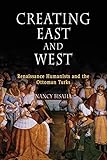Creating East and West : Renaissance Humanists and the Ottoman Turks / Nancy Bisaha.
Material type: TextPublisher: Philadelphia : University of Pennsylvania Press, [2010]Copyright date: ©2004Description: 1 online resource (320 p.)Content type:
TextPublisher: Philadelphia : University of Pennsylvania Press, [2010]Copyright date: ©2004Description: 1 online resource (320 p.)Content type: - 9780812219760
- 9780812201291
- online - DeGruyter
- Issued also in print.
| Item type | Current library | Call number | URL | Status | Notes | Barcode | |
|---|---|---|---|---|---|---|---|
 eBook
eBook
|
Biblioteca "Angelicum" Pont. Univ. S.Tommaso d'Aquino Nuvola online | online - DeGruyter (Browse shelf(Opens below)) | Online access | Not for loan (Accesso limitato) | Accesso per gli utenti autorizzati / Access for authorized users | (dgr)9780812201291 |
Frontmatter -- Contents -- Time Line of Key Events in the Ottoman Advance -- Introduction -- 1. Crusade and Charlemagne: Medieval Influences -- 2. The New Barbarian: Redefining the 'lurks in Classical Terms -- 3. Straddling East and West: Byzantium and Greek Refugees -- 4. Religious Influences and Interpretations -- Epilogue: The Renaissance Legacy -- Notes -- Bibliography -- Index -- Acknowledgments
restricted access online access with authorization star
http://purl.org/coar/access_right/c_16ec
As the Ottoman Empire advanced westward from the fourteenth to the sixteenth centuries, humanists responded on a grand scale, leaving behind a large body of fascinating yet understudied works. These compositions included Crusade orations and histories; ethnographic, historical, and religious studies of the Turks; epic poetry; and even tracts on converting the Turks to Christianity. Most scholars have seen this vast literature as atypical of Renaissance humanism. Nancy Bisaha now offers an in-depth look at the body of Renaissance humanist works that focus not on classical or contemporary Italian subjects but on the Ottoman Empire, Islam, and the Crusades. Throughout, Bisaha probes these texts to reveal the significant role Renaissance writers played in shaping Western views of self and other.Medieval concepts of Islam were generally informed and constrained by religious attitudes and rhetoric in which Muslims were depicted as enemies of the faith. While humanist thinkers of the Renaissance did not move entirely beyond this stance, Creating East and West argues that their understanding was considerably more complex, in that it addressed secular and cultural issues, marking a watershed between the medieval and modern. Taking a close look at a number of texts, Bisaha expands current notions of Renaissance humanism and of the history of cross-cultural perceptions. Engaging both traditional methods of intellectual history and more recent methods of cross-cultural studies, she demonstrates that modern attitudes of Western societies toward other cultures emerged not during the later period of expansion and domination but rather as a defensive intellectual reaction to a sophisticated and threatening power to the East.
Issued also in print.
Mode of access: Internet via World Wide Web.
In English.
Description based on online resource; title from PDF title page (publisher's Web site, viewed 24. Apr 2022)


